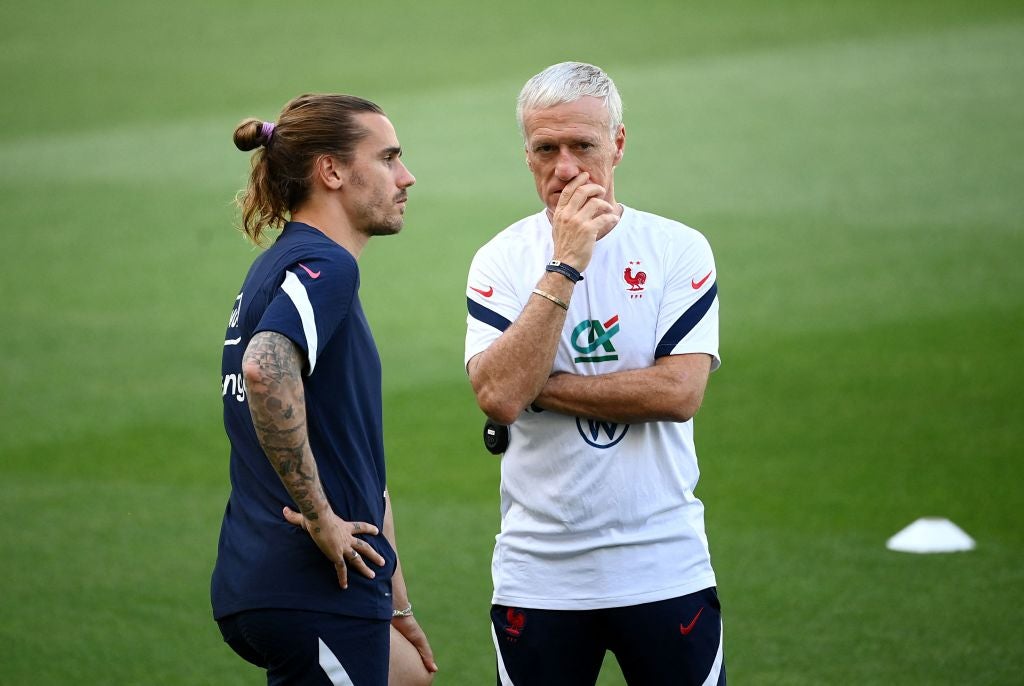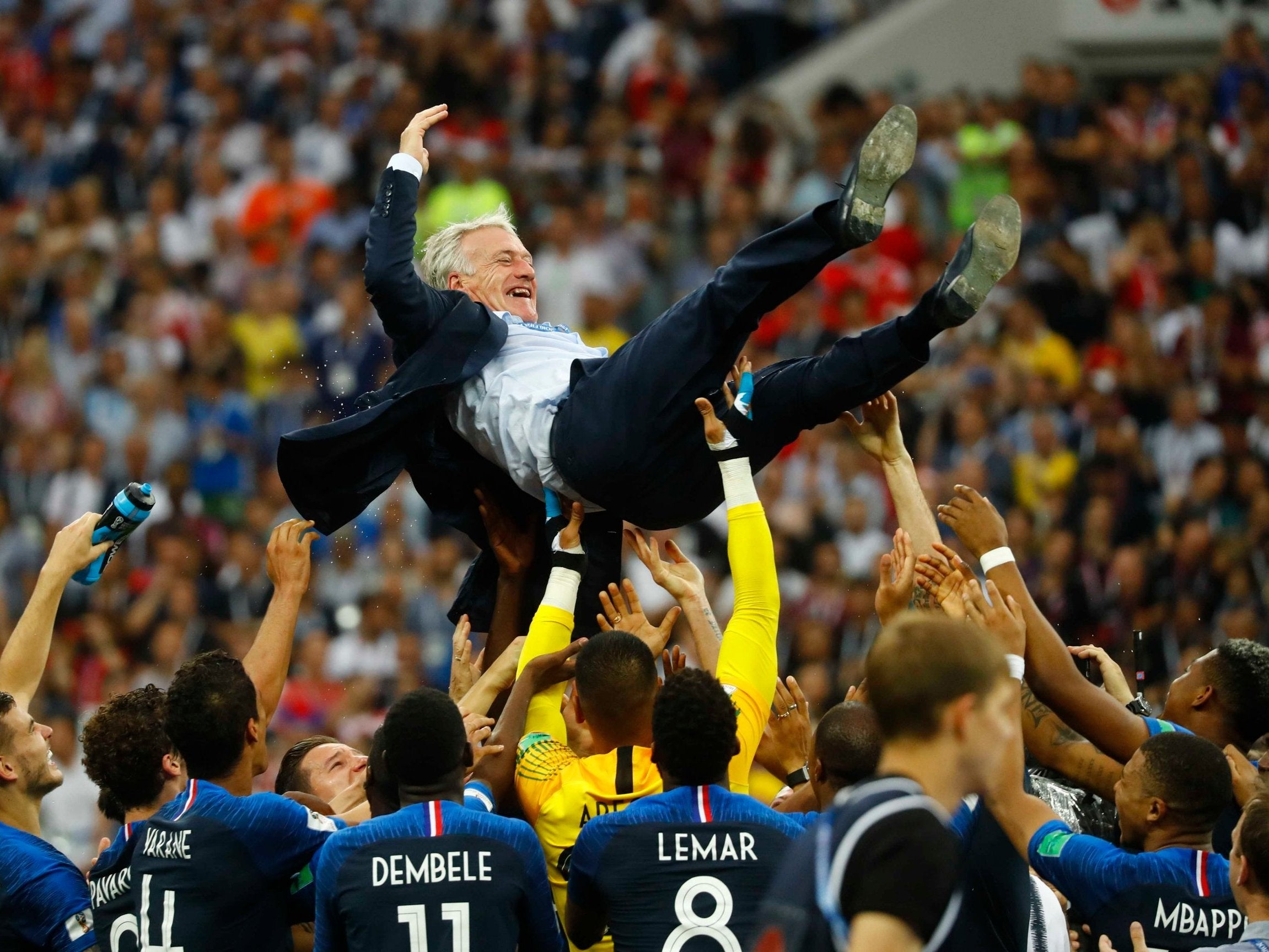How not to defend a World Cup: Reigning champions France must defy history to retain their crown
Brazil’s 2006 side are the only defending champions to even play in a knockout game this millennium, showing just how difficult it will be for France to win the World Cup in Qatar

Your support helps us to tell the story
From reproductive rights to climate change to Big Tech, The Independent is on the ground when the story is developing. Whether it's investigating the financials of Elon Musk's pro-Trump PAC or producing our latest documentary, 'The A Word', which shines a light on the American women fighting for reproductive rights, we know how important it is to parse out the facts from the messaging.
At such a critical moment in US history, we need reporters on the ground. Your donation allows us to keep sending journalists to speak to both sides of the story.
The Independent is trusted by Americans across the entire political spectrum. And unlike many other quality news outlets, we choose not to lock Americans out of our reporting and analysis with paywalls. We believe quality journalism should be available to everyone, paid for by those who can afford it.
Your support makes all the difference.For Germany, the symbolic sight was of Manuel Neuer, deep in South Korea territory, out on the left wing, losing the ball perhaps 80 yards from his own goal before Heung-Min Son raced away to score.
For Spain, it was of a shellshocked Vicente del Bosque trying to board the Chile coach. Perhaps the World Cup-winning manager was so accustomed to joining celebrating players on a bus that he failed to notice the Spanish-speaking victors were from South America, not Europe.
For Italy, it may have been the image of Fabio Cannavaro, so immaculate in the 2006 World Cup that he completed the 690 minutes of the tournament without a yellow card, dicing with a red in his desperate attempts to halt Slovakia.
The common denominators lay in embarrassment for the previously omnipotent, the chastening, humiliating cases of the teams who conquered the world suffering the earliest of exits. Until Italy in 2010, only three champions had ever gone out in the group stage and, as one was an Azzurri side in 1950 who bore few similarities with the 1938 champions, perhaps only two. Since then, all three have gone out in the group stage, culminating four years ago in Germany’s worst World Cup since 1938.
It felt like a case of underachievement in 2006 when Brazil, having entered as favourites and with four forwards of the calibre of Ronaldo, Ronaldinho, Kaka and Adriano, were only quarter-finalists. Yet they are the only defending champions to even play in a knockout game this millennium.
So the warnings to France now do not merely come from their own past. Didier Deschamps had retired before the majority of the squad he captained to glory in 1998 reconvened in South Korea four years later, widely tipped to retain their crown. Some were ageing, some injury-hit, but France departed with more red cards than goals. From then on, perhaps winning the World Cup has seemed football’s Faustian pact. There has long been a theory that the manager of the month award is cursed, a shortcut to failure the following month. The same may be said of securing the most prestigious prize of all, even if it is a trade-off many would happily accept.
While retaining the Champions League is famously difficult, and something only Real Madrid have done since 1990, most title defences tend to end deep in the knockout stages. The World Cup has had a different dynamic. If a four-year cycle may make a variance in performance more likely, continuity may have backfired for some of the fallen champions.
Each had a lamentable campaign under their triumphant manager in Lippi, who had left in 2006 but returned in 2008, Del Bosque and Joachim Low. Lippi proved less of a loyalist than some, choosing not to take Fabio Grosso or Alessandro del Piero to South Africa. But Italy were scarcely young in 2006, took nine thirtysomethings in 2010 – and Gianluigi Buffon, Gennaro Gattuso and Andrea Pirlo all had their participation limited by injury.
For Italy, two draws and a defeat showed problems increased. Spain, however, imploded, conceding five times in 36 minutes to the Netherlands. Of the 14 players Del Bosque used that day, 10 had appeared in the 2010 final and 11 in the Euro 2012 final. Nine of his squad had at least 80 caps, 12 at least 60, but experience proved no asset. Diego Costa was a stylistic misfit, but an old team’s era of dominance ended dramatically.
Germany’s demise featured out-of-form players, particularly Jerome Boateng, Sami Khedira and Thomas Muller, fractiousness in the camp, prompting Mesut Ozil to retire from international football, and the suspicion a manager was ignoring the next generation, Leroy Sane in particular, to stick with the tried and trusted.
In each case, there may have been psychological issues, perhaps exacerbated by the sense of how far they were falling, maybe compounded by their unfamiliarity with setbacks. Lippi said Italy turned up “with terror in their heart and head and legs” for the decisive game with Slovakia. Spain had tactical issues, caught on the counter-attack by Holland, an old side unable to cope with Chile’s ferocious pressing.

France may spot some common denominators. Injuries have been a constant, ruling out N’Golo Kante and Paul Pogba before the squad was selected and after for Christopher Nkunku and Presnel Kimpembe, while Raphael Varane and Karim Benzema are carrying injuries. Yet the need to construct a new midfield means these are one defending champions who won’t have too much continuity: not in a squad with 12 players with fewer than 10 caps apiece. That Deschamps is likely to use a different formation to 2018 means France are not stuck in stasis. But, a decade into the manager’s reign, there is a question of whether another manager has outstayed his welcome.
The draw, pitting them against Australia, Denmark and Tunisia, seems to afford France a fine chance to reach the last 16, almost uncharted territory for recent winners. Yet that offers parallels with the past. Their 2002 pool, with Senegal, Denmark and Uruguay, scarcely looked the hardest. Italy’s draw in 2010, with Paraguay, New Zealand and Slovakia, appeared arguably the easiest group then. Spain, in 2014, and Germany, four years later, got given tougher assignments.
Yet each was out after three games; Spain’s fate was sealed after two. For Deschamps, who has made history as one of only two men to win the World Cup as both captain and manager, the first aim is to fly in the face of it and to ensure France avoid the fate of the former champions.


Join our commenting forum
Join thought-provoking conversations, follow other Independent readers and see their replies
Comments